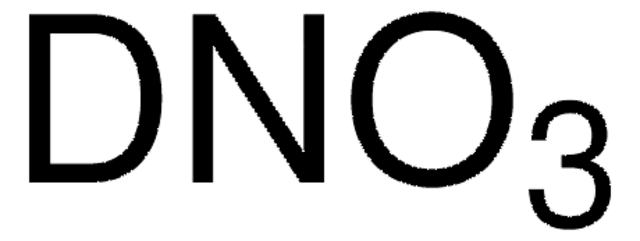1.00443
Nitric acid
65%, EMPLURA®
Synonym(s):
Nitric acid solution
About This Item
Recommended Products
Product Name
Nitric acid 65%, EMPLURA®
vapor pressure
9.4 hPa ( 20 °C)
Quality Level
product line
EMPLURA®
form
liquid
concentration
64.3-66.4% HNO3
impurities
≤0.0001% As (Arsenic)
≤0.0003% Chloride (Cl)
≤0.0004% Fe (Iron)
≤0.0005% Heavy metals (as Pb)
≤0.001% Ca (Calcium)
≤0.001% NH4 (Ammonium)
≤0.001% Sulfate (SO4)
≤0.003% Nitrogen oxides (as N2O3)
pH
<1 (20 °C in H2O, strongly acid)
bp
121 °C/1013 hPa
mp
-32 °C
density
1.39 g/cm3 at 20 °C
storage temp.
2-30°C
SMILES string
O[N+]([O-])=O
InChI
1S/HNO3/c2-1(3)4/h(H,2,3,4)
InChI key
GRYLNZFGIOXLOG-UHFFFAOYSA-N
Looking for similar products? Visit Product Comparison Guide
Application
- In-vitro evaluation of microleakage of bioceramic root-end filling materials: A spectrophotometric study.: This research employed 65% nitric acid for sample preparation in the spectrophotometric analysis of microleakage in dental materials, providing insights into the effectiveness of different bioceramic materials (Gupta and Kewalramani, 2021).
- A comparative evaluation of resin- and varnish-based surface protective agents on glass ionomer cement - a spectrophotometric analysis.: The study used 65% nitric acid for the preparation of glass ionomer cement samples to evaluate the effectiveness of surface protective agents through spectrophotometric methods (Tyagi et al., 2020).
- Spectrophotometric analysis evaluating apical microleakage in retrograde filling using GIC, MTA and biodentine: an in-vitro study.: This research utilized 65% nitric acid in the preparation of samples for the evaluation of microleakage in dental restorative materials, highlighting the performance of various materials in preventing leakage (Nepal et al., 2020).
- Influence of stacked structure of carbons modified on its surface on n-pentane adsorption.: This study applied 65% nitric acid for surface modification of carbon materials, investigating the effects on adsorption properties, with significant findings on how surface structure influences adsorption efficiency (Carvajal-Bernal et al., 2019).
Analysis Note
Identity: passes test
Appearance of solution: passes test
Chloride (Cl): ≤ 0.0003 %
Iodate, Bromate: passes test
Nitrogen oxides (as N₂O₃): ≤ 0.003 %
Sulfate (SO₄): ≤ 0.001 %
Heavy metals (as Pb): ≤ 0.0005 %
As (Arsenic): ≤ 0.0001 %
Ca (Calcium): ≤ 0.001 %
Fe (Iron): ≤ 0.0004 %
NH₄ (Ammonium): ≤ 0.001 %
Residual solvents (ICH Q3C): ...excluded by production process
Evaporation residue: ≤ 0.01
Date of expiry: see product label
Legal Information
signalword
Danger
Hazard Classifications
Acute Tox. 3 Inhalation - Eye Dam. 1 - Met. Corr. 1 - Ox. Liq. 3 - Skin Corr. 1A
supp_hazards
Storage Class
5.1B - Oxidizing hazardous materials
wgk_germany
WGK 1
flash_point_f
Not applicable
flash_point_c
Not applicable
Certificates of Analysis (COA)
Search for Certificates of Analysis (COA) by entering the products Lot/Batch Number. Lot and Batch Numbers can be found on a product’s label following the words ‘Lot’ or ‘Batch’.
Already Own This Product?
Find documentation for the products that you have recently purchased in the Document Library.
Customers Also Viewed
Our team of scientists has experience in all areas of research including Life Science, Material Science, Chemical Synthesis, Chromatography, Analytical and many others.
Contact Technical Service





